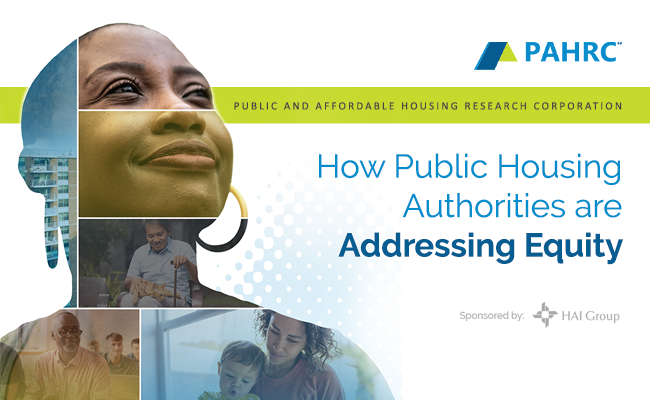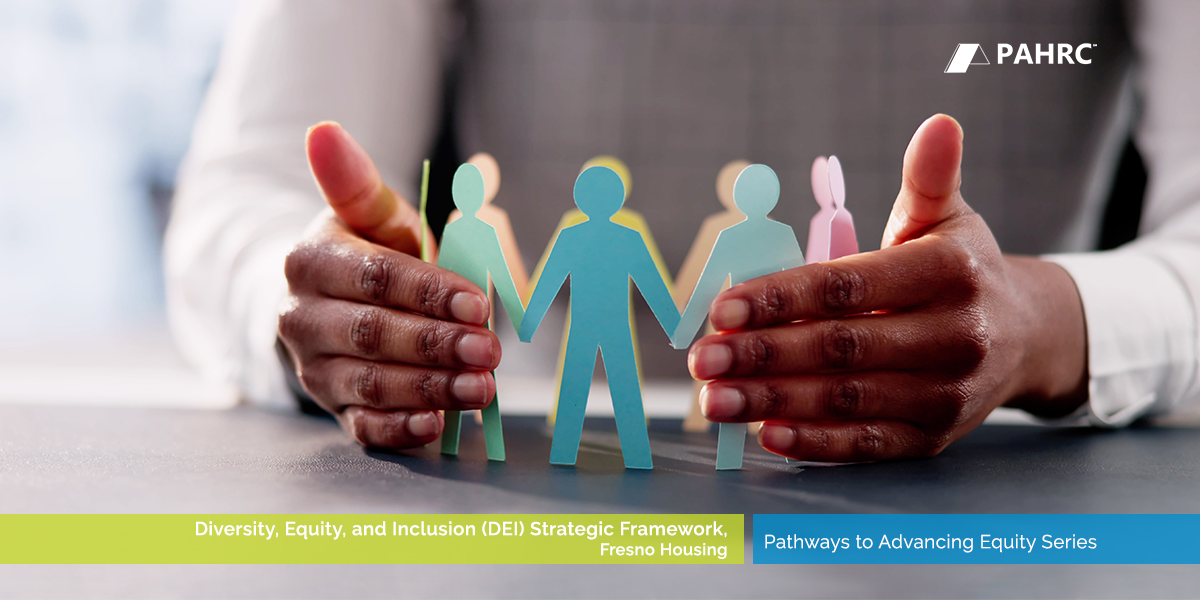Opportunity Home San Antonio, formerly known as San Antonio Housing Authority, is working to prevent institutional racism and ensure employee equity through established goals to ensure that race does not determine housing assistance or supportive service outcomes and that residents live in neighborhoods that benefit from equitable investment across systems.
Opportunity Home's JEDI team is featured in “PHA Pathways for Advancing Equity,” a new report released by the Public and Affordable Housing Research Corporation (PAHRC), a member of HAI Group’s family of companies.
Challenge
Opportunity Home recognized the need to address institutional racism and ensure equitable outcomes for both residents and employees. This required systemic changes to policies, programs, and practices to prevent unfair results based on race.
Solution
To achieve its goals, Opportunity Home:
- Adopted equity, excellence, and compassion as core values.
- Strives to operationalize equity throughout its organization.
- Defines equity as delivering services in a way that results in fair and equal outcomes.
- Ensures that systems, policies, and programs do not create unfair results.
Opportunity Home hired a director of equity, diversity, and inclusion to help adopt these values.
Implementation
JEDI team and equity reviews
The Justice, Equity, Diversity, and Inclusion (JEDI) Team—a group of representatives from across all departments at Opportunity Home—was established in September 2022. The team reviews proposed policies and discusses topics regarding equity and inclusion. Meeting once per month, they serve as liaisons for their departments, providing feedback on department needs and reviewing company literature, such as the employee handbook. This representation helps identify the appropriate language for inclusivity.
Opportunity Home has established an equity scorecard to hold staff accountable for the organization’s goals. The EDI director collaborates with Opportunity Home’s internal audit team to conduct an equity review simultaneously. They aim to review six policies or processes per year with the audit team.
Through this process, Opportunity Home has updated many housing policies to improve equitable outcomes.
-
Over-Housing: An early success was changing their over-housing policy to allow households with family composition changes to remain in their homes unless there are health or safety concerns or if the organization needs the unit for a family that requires that number of bedrooms.
-
Criminal Screening: Opportunity Home created a rubric with screening tiers for different criminal offenses to provide housing assistance compassionately and equitably.
-
Recertification: Using their Moving to Work (MTW) flexibility, Opportunity Home recertifies income tri-annually to give residents time to prepare for possible rent increases.
-
Fee Structure: Opportunity Home standardizes fee structures across its portfolio.
-
Housing Choice Voucher (HCV) Waiting List Marketing: An analysis found that Opportunity Home was not receiving applications across races at the same rate. In response, they evaluate their marketing strategy to ensure they intentionally reach out to places frequented by groups experiencing disparate outcomes.
As an MTW agency, Opportunity Home must evaluate its planned and ongoing MTW activities. The agency revised its evaluation process to include steps to prevent institutional racism and identify ways the proposed MTW activities can remedy long-standing inequities. Staff charged with MTW activities must answer questions to ensure they are not unintentionally perpetuating racism.
“Give yourself grace because this work is not a sprint, but there are quick wins.” - Opportunity Home
Department-wide equity plans
Departments must also describe ways to improve equity within their department-wide business plans. As part of this planning process, department heads must ensure that race does not determine housing assistance or support-service outcomes, such as Information Technology promoting digital inclusion, Finance building a budget equity tool, and Facilities expanding accessibility and redesigning buildings to reflect residents’ needs.
Marketing is another important aspect, as it holds Opportunity Home accountable and demonstrates commitment to its goals. It shares goals and strategies internally to encourage EDI with staff and promotes upcoming webinars and resources that employees can access to advance these goals. To support Opportunity Home’s efforts, the EDI director led a half-day workshop to discuss the equity logic model with the theory of change and Opportunity Home’s equity scorecard.
Externally, Opportunity Home updated its website to include its EDI statement and activities and developed brochures and cards to distribute at its properties to demonstrate a commitment to these goals.
Impact
While the JEDI Team is still new, the group and EDI department have accomplished many initiatives. In addition to the review and revision of the employee handbook, some changes include:
- Seeing through the implementation of Wi-Fi in all Opportunity Home properties.
- An internal JEDI café for community members to access EDI information in a safe space.
- Non-mandatory PTO between Christmas and New Year’s Day.
- Moving some job requirements, such as a driver’s license, from mandatory to the preferred category.
- Ensuring webpages and all documents are available in languages for the families Opportunity Home serves.
- Redesigning the website using colors to support the visually impaired.
- Growing the EDI department, including full-time staff and a paid internship.
Opportunity Home also exceeded its goal of HCV applications by 5,000—nearly one-third of its goal—due to its targeted marketing campaign.
Additional Programs
- Non-mandatory quarterly training from the Racial Equity Institute is available to all employees and residents.
- Workshops covering various topics, including the history of housing in San Antonio, neurodiversity in the workplace, ageism, microaggressions, and more.
- The Living Inclusive series, where the EDI department visits residents at properties to bridge cultural misunderstandings, increase shared understanding and respect for one another, and help build community.
- Inviting college students to discuss homelessness in their demographic and the battle of choosing shelter or furthering their education.
- Using an equity lens for the home selection process.
Conclusion
Opportunity Home’s initiatives demonstrate a comprehensive approach to preventing institutional racism and ensuring equity for both residents and employees. Through the establishment of the JEDI Team, implementation of equity reviews, and commitment to inclusive practices, Opportunity Home is making significant strides in creating fair and equal outcomes.
For more detailed insights and similar case studies, refer to “PHA Pathways for Advancing Equity,” a report by the Public and Affordable Housing Research Corporation (PAHRC), a member of HAI Group’s family of companies.
This article is for general information only. HAI Group makes no representation or warranty about the accuracy or applicability of this information for any particular use or circumstance. Your use of this information is at your own discretion and risk. HAI Group and any author or contributor identified herein assume no responsibility for your use of this information. You should consult with your attorney or subject matter advisor before adopting any risk management strategy or policy.







